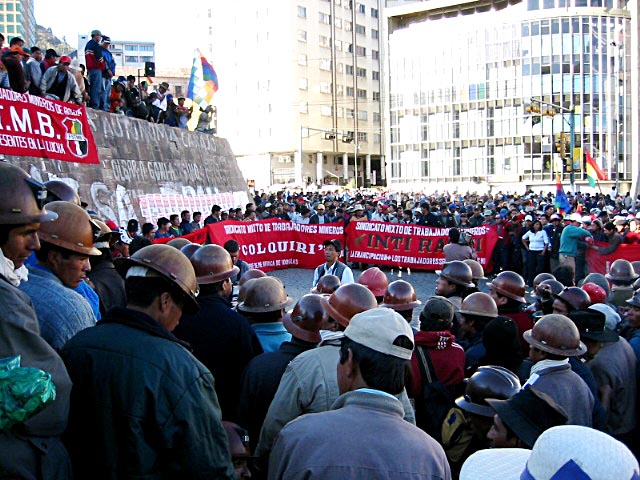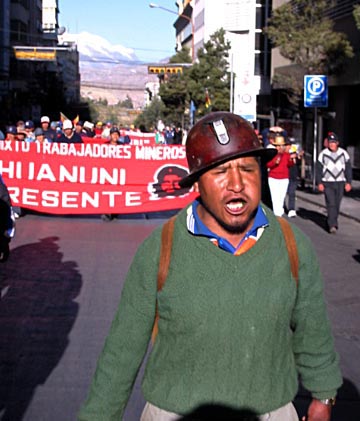
June 2005
Bolivian
Workers Move Against
Threatened
“Constitutional Coup”

Miners in forefront
of battle against imperialist puppet governments in Bolivia. Facing
threat of
“constitutional coup,” thousands mobilized in the streets of La Paz
June 8 calling to drive out the
corrupt Congress. (Internationalist
photo)
For a Worker,
Peasant and Indian Government!
LA PAZ, JUNE 9 – Thousands of miners and
peasants have moved to surround the central zone in the city of Sucre
where the Bolivian Congress
was scheduled to meet this morning to decide on a new president. Huge
demonstrations demanding the nationalization of gas and oil resources
forced
unelected president Carlos Mesa to resign. Now parties from Bolivia's
military
dictatorships and the regime of Gonzalo Sánchez de Lozada, which
massacred
protesters in October 2003, are vowing to install Hormando Vaca
Díez in the
presidency. This hard-line senator from Santa Cruz has vowed to “impose
order”
in the face of the mass mobilizations that have shut down the capital
and much
of the country for the past weeks. His attempt to take over has been
characterized as a “golpe
blanco” (a
“bloodless” or “constitutional”
coup
d’état). Meanwhile, the threat of an outright military takeover
is very real.
Radio
reports state that up to 6,000 miners from Potosí, Oruro, Uyuni
and other
areas have joined with peasants from Potosí and southern
Cochabamba to converge
on Sucre demanding that Vaca Díez abandon
his attempts to become president. Simultaneously, the Federation of
Miners
Cooperatives (Fencomin) marched through El Alto, the sprawling
impoverished
city on the heights above La Paz, saying if Vaca Díez does not
resign
there
will be “civil war.” Even sectors of the bourgeoisie are worried that
the
country could blow apart: the mayor of La Paz launched a hunger strike
against
the prospect of Vaca becoming president. The leader of the Movment
Toward
Socialism (MAS), Evo Morales, a party based on the coca-growing
peasants of the
Cochabamba region, is calling for the head of the supreme court to take
over
and call new elections. In return, Morales is offering to call off
protests,
knifing the miners and urban workers in the back.
Yesterday,
however, hundreds of members of the Federation of Mine Workers of
Bolivia
(FSTMB), historically the backbone of the labor movement, headed up a
huge
march through La Paz chanting “Death to the bourgeois parliament,” “Not
30 or
50 (percent tax on gas exports), but nationalization,” “With gas,
without gas, miners in La Paz” and other slogans. In a
communiqué, the
FSTMB criticized the demand for new elections as an attempt to
“evade the
nationalization of hydrocarbons” (gas, oil, etc.), stating that “the
existing
democratic system has degenerated and collapsed” and calling for a
“people's
revolutionary government” and a “Great National Popular Assembly.”
The
call for a “popular assembly” has been a central theme of what the
bourgeois
press sees as the “radical” wing
of the protests, sometimes counterposed to Morales’ call for a
“constituent assembly.” Frequently, the demand is linked to slogans for
“poder
popular” (people’s power) and a “gobierno popular” or “gobierno
del pueblo” (people’s government). The reference to a “people’s”
assembly
is a deliberate effort to distinguish such a body from a workers council
such as the soviets that were the organizing center of the
Russian
Revolutions of 1905 and 1917. The call for a “popular assembly” means a class-collaborationist
perspective, seeking an alliance with “progressive” elements of the
bourgeoisie, whatever its more leftist-posing proponents may claim. And
as with
Salvador Allende’s Unidad Popular government in Chile, popular-frontist
class collaboration spells defeat for the exploited and oppressed.
 Bolivian
tin miners from Huanuni march in La Paz on June 8.
Bolivian
tin miners from Huanuni march in La Paz on June 8.
(Internationalist
photo)
Yesterday
morning, a meeting in El Alto formally called into being an “Asamblea
Popular
Nacional Originaria” (National Popular and Native People’s Assembly).
The
meeting was called by the Bolivian Workers Federation (COB), the FSTMB
miners
union, the United Bolivian Peasant Union (CSUTCB), the national street
vendors
union, the Regional Workers Federation (COR) of El Alto and the
Federation of
Neighborhood Assemblies (Fejuve) of El Alto, with delegates from 60
organizations including the La Paz provincial transport union, La Paz
municipal
teachers union, Public University of El Alto and others. The first
resolution
of the “APNO” declared El Alto to be the “general headquarters of the
Bolivian
Revolution,” while other resolutions described it as an “instrument of
people’s
power,” called for delegates to be elected in assemblies and open
meetings (cabildos),
and for the formation of self-defense committees and supply committees
in every
sector.
Opportunist
leftists were quick to hail the new APNO as a “counterpower”
against the capitalist state. The right-wing press
went apoplectic, with a fire-and-brimstone editorial in La
Razón today
accusing the El Alto militants of “intimidation,” “terror,” seeking a
“totalitarian regime,” being like “Hitler’s Nazism, Mussolini’s
fascism,” and
the like. In fact, in October 2003 El
Alto was the target of a genuine
reign of
terror by a dictatorial regime, which the bourgeois media
wholeheartedly
supported. Yet the incipient Popular Assembly, as presently
constituted, is far
from being an organ of dual power. It was called into being in a
temporary
“vacuum” at the head of the government, while the capitalist state in
the form
of the army and police is still very much in place. For several leaders
of the
APNO, its proclamation was a fallback position, as in the case of COB
leader
Jaime Solares, who at key moments has
been angling for a “civil-military” regime with “patriotic” military
officers,
or Fejuve leader Abel Mamani, who is seeking a national dialogue under
the aegis
of the Catholic church.
The
current Popular Assembly is essentially a leadership cartel whose
future
evolution is uncertain. A genuine centralizing organ of dual power, a
soviet,
would have to grow out of dual power bodies throughout the country,
which do
not presently exist. Beyond the mass mobilizations, it is necessary to
form
workers councils of delegates, recallable at any time, as
well as peasants councils and councils of rank and file soldiers. They
must institute workers control
of vital factories, mines, transportation and communications
facilities; act as decision-making and executive bodies under
proletarian
leadership rather
than talk-shops for rhetorical hot air; organize self-defense
groups (the
core of worker and peasant militias) under the authority of the mass
organizations of the working people; and undertake the
distribution of
food and vital supplies to the population.
The
battle with the bourgeoisie will not be won simply by passively digging
in for
an endless strike – it is necessary to undertake positive steps
to
establish
workers power. Today, for example, with supplies of gas for cooking
dwindling
to zero in the capital, the impact of the El Alto strike and blockade
can be intensified
by carrying out distribution of gas to poor
neighborhoods, clinics, etc., under strict control by commissions of
the
Senkata YPFB plant workers, miners and slum dwellers. Such actions will
dramatically underscore the capacity of the workers to rule, in
contrast to the
corrupt bourgeois authorities. When this begins to happen, the
way will
be open to ending the present stand-off and advancing to workers
revolution.
The
calls for a Popular Assembly hark back to the body of
that
name which briefly existed in mid-1971 and has since become
mythologized by
various opportunist currents. The “Popular Assembly” of 1971,
headed
by left-nationalist mine union leader Juan Lechín, in
reality (despite sometime leftist declarations) supported the military-populist
government of General Juan José Torres, and
left the workers politically and physically disarmed in the face of the
long-awaited coup of rightist general Hugo Banzer. Its leaders went on
to form
a “Revolutionary Anti-Imperialist Front” with (by then deposed) General
Torres
and other bourgeois and reformist sectors. In fact, the current calls
for a
popular assembly in Bolivia are formulated so as to leave the door open
to just
the kind of class-collaborationist “alliances” that led to bloody
defeats for
the Bolivian workers, peasants and Indian peoples in the past.
Far
from calling to repeat the debacle of the Popular Assembly, a
Trotskyist party
in Bolivia would fight now for the formation of
workers, peasants and
soldiers councils, like those the Russian Bolsheviks led to
power in October
1917, which could be the basis for a worker, peasant and
Indian
government. Genuine soviets would be based on proletarian
internationalism,
rather than bourgeois and petty-bourgeois nationalism, extending the
hand of
solidarity to the Chilean, Peruvian and Argentine working people and to the
workers in
the
imperialist centers as well. This is the only way to defend the working
people
and oppressed from the threats that grow more dangerous with each
passing hour. n
To contact the Internationalist Group and the League for the Fourth International, send e-mail to: internationalistgroup@msn.com